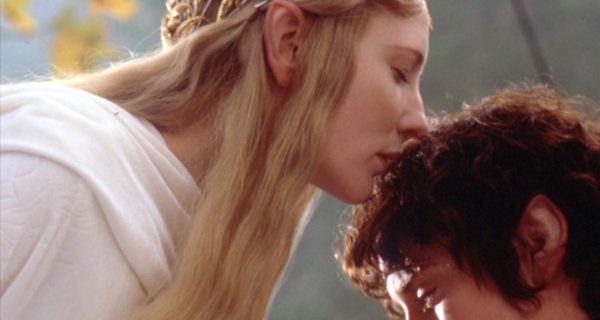When Frodo raises the star glass and cries out, “Hail, Eärendil, O Brightest of Stars!” he invokes a history of which, with Sam, he is now a major part. Throughout the history of Arda (the earth) there has been a war against the Light that began with Morgoth and now continues with his lieutenant, Sauron. The light of the Silmarils captured in the star glass once blazed forth from Morgoth’s iron crown after he stole them from Fëanor, their maker. One now shines out in the heavens at morning and at evening in the ship, Vingilot, with “Eärendil the mariner sat at the helm, glistening with dust of elven-gems, and the Silmaril was bound upon his brow”. We see it still today and know it as Venus, the Morning Star and the Evening Star.
Eärendil carried the Silmaril back across the seas to the Undying Lands and brought too the prayer of the peoples of Middle-earth to the Valar for mercy. For Morgoth had reduced them to ruin and, perhaps worse even than this, the sons of Fëanor, bound by a terrible oath to their father not to allow the Silmarils to fall into the hands of anyone even a friend, attacked Eärendil’s people and destroyed their homes. Eärendil, even as he bore this sorrow in his heart, prayed too for the sons of Fëanor when he came before the Valar.
Why do I tell this story even as Frodo holds the Star Glass before Shelob? It is because of the place of mercy in the whole of Tolkien’s great story. Tolkien said of Morgoth that “to him that was pitiless the deeds of pity are ever strange and beyond reckoning”. All through Tolkien’s tale it is such deeds that undo the enemy. Why is Frodo’s cry effective? It is because of the pity of Eärendil. It is because of the pity of Bilbo. It is because of the pity of Galadriel who gave the glass to Frodo. We do not stand because of our own deeds but because of all who have come before us.
In his poem on the Advent antiphon, O Oriens, Malcolm Guite makes this point exactly. Oriens is the Morning Star, the Dayspring, the herald of grace and of hope. Guite quotes from Dante’s Paradiso at the heading of his poem when Dante tells us that he saw “light in the form of a river”. The story of light is a river in which we, by grace and mercy, now stand.
“Dante and Beatrice are bathing in it now, away upstream…so every trace of light begins a grace in me, a beckoning. ”
Once again we remember Frodo’s dream in the halls of Elrond in Rivendell; a dream that ended with the sound of Bilbo telling the story of Eärendil. And we begin to understand that we too receive so much from the mercy of others and that every act of mercy that we perform today is a gift to people yet unborn. We stand here because of the prayers of others before us. Others stand today and will stand in times to come because of our prayer and our acts of mercy.


Beautiful! One has to wonder at the awesome literary genius of Tolkien. His fictional characters’ deeds play out as any such deeds would in any real world environment, even today… And those deeds ripple outward into his fictional universe, affecting everything they touch as if it were not a fictional universe at all, but a real place composed of time, of places, of deep wells of human experience, and of supernatural and preternatural spirit. Thank you for pointing out yet another stream of meaning in Tolkien’s endlessly enthralling works!
This isn’t surprising since Tokien’s writings are based on Catholic theology.
Very interesting.
Thank you for this! Love it!
Very, Very sound point.When courage, strength, resolve, fidelity, fellowship, purpose and all the other virtues had done all they could; it was the long chain of mercy extended that made the final difference for the success of the task.
I read a comment once from his nephew about how angry Tolkien was with the changes at Vatican II that at Mass one Sunday while everyone was making the responses in English Tolkien was belting out the responses in Latin. Catholic to the very end.
Wonderful. Love it. Thank you.
Another gorgeously rendered article delving into the spiritual depths of Tolkien’s writings! I have long been a believer in the concept of even the smallest acts of kindness and mercy having cosmic repercussions, not just for us, but for our descendants, and how our ancestors acts of kindness and mercy have the same effects on us. It is, in essence, the “river of light” that connects the communion of saints and the Church Militant on earth. I love how you brought to the fore the story of the stolen star which ultimately enables Frodo to receive the mercy he implores.